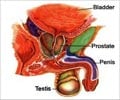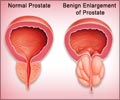A new study has suggested that brief stress management sessions prior to and immediately after surgery may have both short- and long-term benefit for men undergoing a radical prostatectomy for early-stage prostate cancer.
The study, conducted by researchers at The University of Texas M. D. Anderson Cancer Center, is the first to examine the benefits of psychosocial intervention for prostate cancer patients prior to surgery."We know that for men with early-stage prostate cancer, the time when they are making treatment decisions is very stressful," said Lorenzo Cohen, Ph.D., the study's senior author and professor in M. D. Anderson's Departments of Behavioral Science and General Oncology, and director of the Integrative Medicine Program.
"A radical prostatectomy is not without possible, very personal, consequences, including urinary incontinence and erectile dysfunction. Patients may also be worried about the uncertainty that the surgery will cure their cancer," Cohen added.
For the randomized study, 159 early stage prostate cancer, radical prostatectomy patients were assigned to receive either: two 60-90 minute sessions of pre-surgical stress management intervention and brief booster sessions the morning of, and 48 hours following surgery; two 60-90 minute individual supportive attention sessions and boosters similar to the stress management group; or standard care.
Assessments occurred before the sessions, one month before, one week before, and the morning of surgery, as well as six weeks, six and 12 months following surgery.
The stress management was based on aspects of cognitive behavioral therapy. Men in the stress management group met with a clinical psychologist and were taught simple behavioral techniques, including diaphragmatic breathing and relaxing guided imagery and cognitive therapy.
Advertisement
For the stress management group, the men were exposed to an imagery experience of the day of surgery - all the sounds and sensations from pre-op, to the recovery room, to coming out of anesthesia - while they were in a relaxed state.
Advertisement
The researchers found that in terms of short-term effects, assessed at one week before and the morning of surgery, men in the stress management group had the lowest levels of mood disturbance followed by those in the supportive attention group, with patients in the no therapy group having the highest level, with the difference between the stress management and standard care groups being statistically significant.
During the long-term follow-up, assessed at six weeks, six and 12 months, patients in the stress management group reported a higher level of physical functioning and aspects of quality of life than patients in the other two cohorts; the difference between the stress management and standard care groups was statistically significant.
The largest difference between the groups was at the 12-month follow-up, when the standard care group reported lower levels for physical functioning than those who received the stress management intervention.
The study has been published in the current issue of the Journal of Clinical Oncology.
Source-ANI
SRM















